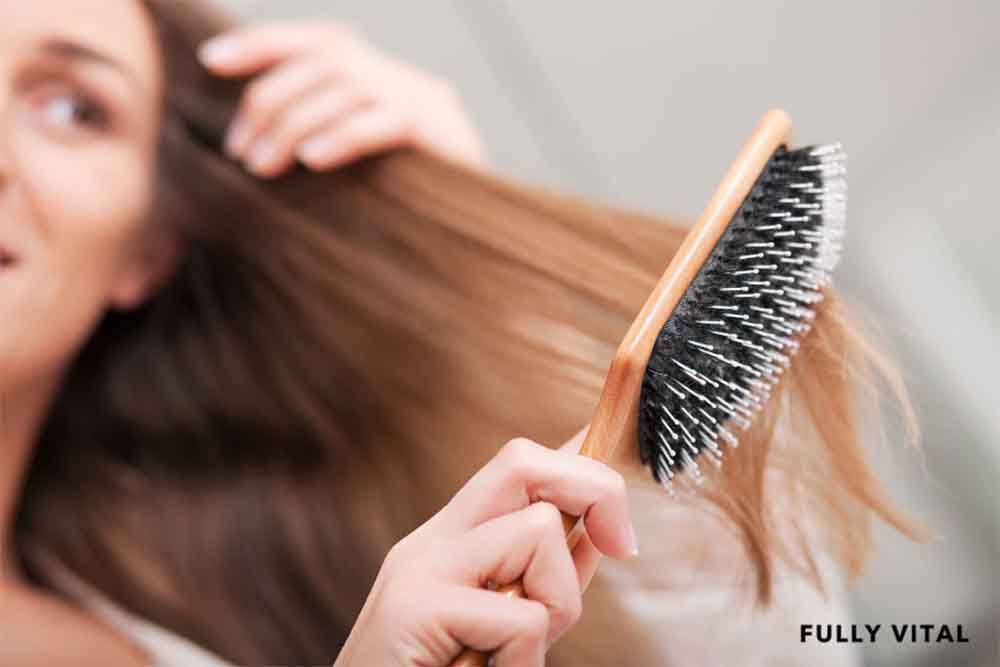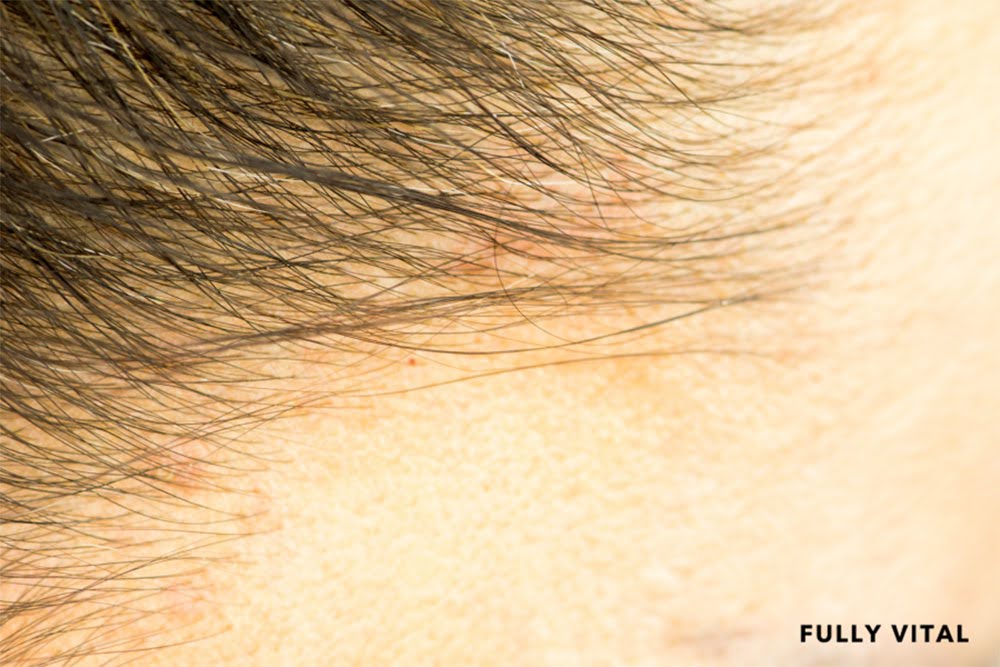
The Brushing Dilemma: Can Brushing Hair Really Lead to Hair Loss?
Ever heard that brushing your hair 100 times a day makes it healthier and shinier?
Turns out, it's based on the idea that brushing spreads your scalp's natural oils.
But too much brushing might lead to hair loss, leaving us wondering if brushing is good or bad for hair health.
At Fully Vital, we're diving into this to uncover the truth.
Join us in exploring whether your brushing routine helps or harms your hair, and how to care for it best.
At Fully Vital, we also offer products that are specifically designed to stimulate hair growth.
These products can be a great addition to your hair care routine, complementing your brushing habits and ensuring your hair not only looks good but also maintains its health and vitality.

I LOVE MY HAIR NOW
FullyVital hair serum and hair vitamins made tremendous improvements in my hair. I truly love my hair now.
Dorit S.,
Understanding Hair Structure And Function
Hair has two parts: the follicle, making hair grow and keeping it healthy, and the visible shaft with layers that protect and give shine.
Brushing moves oils along your hair, but too much or too hard can harm it.
At Fully Vital, we believe in gentle care to keep hair healthy and beautiful.
Hair Structure Basics
Hair comprises the follicle beneath the skin and the visible shaft, with the follicle responsible for growth and oil production, crucial for hair health.1
Shaft Layers
Understanding the three layers of the hair shaft - the outer layer protecting and imparting shine, the middle layer providing strength, and the innermost layer adding elasticity.
Purpose of Brushing
Beyond detangling, brushing redistributes natural oils from the scalp along the hair, aiding in nourishment and maintenance.
Potential Damage
Excessive or harsh brushing can lead to hair damage, breakage, or even hair loss by pulling strands out.
Choosing the Right Approach
The choice of brush and gentle brushing techniques are pivotal in maintaining hair health without causing damage.
Balanced Care Philosophy
At Fully Vital, we advocate for a balanced approach to hair care, emphasizing gentleness and thoughtful techniques to ensure optimal hair health and appearance.
Role Of Hair Brushing In Daily Life
Brushing your hair is more than just making it look neat.
It's a part of our culture and habits.
Here's why it's important:
- Cleaning: Brushing removes loose hairs, dandruff, and leftover hair products. This keeps your scalp and hair clean.
- Scalp Health: Gentle brushing can boost blood flow to your scalp. This might help your hair grow better. It's like a mini-massage that can also relax you.
- Spreading Oils: Brushing moves natural oils from your scalp to the rest of your hair. This acts like a natural conditioner, making your hair strong and shiny.
- Choosing The Right Brush: The type of brush matters. Different brushes work for different hair types. The right brush means less damage to your hair.

How Excessive Hair Brushing Can Cause Hair Loss
Too much brushing, done with good intentions, can lead to hair loss due to strain on the hair and scalp, not genetics or medical issues.
Understanding Hair Brushing And Over-Manipulation
Aggressive brushing weakens hair, especially when wet, causing breakage and thinning over time.
The Damage Done To Hair Cuticles
Excessive brushing damages the protective cuticle layer, leaving hair prone to splitting and breakage.
Traction Alopecia: A Brushing Concern
Constant pulling from brushing can worsen traction alopecia, leading to potential permanent follicle damage.
The Issue With The Wrong Brushes
Using the wrong brush type—too stiff or mismatched to your hair—can worsen hair fallout.
Balance Is Key
Gentle, tailored brushing techniques are crucial to prevent hair damage and loss, a principle we advocate at Fully Vital for optimal hair care.
Adverse Effects Of Over Brushing On Hair Scalp
Brushing too much for that perfect look might not be worth it—it can mess up your scalp and hair.
It throws off your natural oil balance, makes your scalp red and itchy, and even leads to hair getting weaker and breaking more easily.
Disruption Of Natural Oil Distribution
Over-brushing promises shiny hair but harms scalp health, disrupting the natural oil balance and leading to dryness or excess oil production.2
Scalp Inflammation And Irritation
Aggressive brushing can inflame the scalp, causing redness and potential long-term issues like dandruff or dermatitis.3
Micro-Cuts And Damage To The Scalp
Excessive force from brushing can create unseen micro-cuts, inviting infections and hindering hair health and growth.4
Weakening Of Hair Follicles
Repeated pulling weakens follicles, causing increased shedding and a visible reduction in hair density.
Increased Risk Of Hair Breakage
Over-brushing strains hair shafts, especially when detangling knots, leading to breakage and damage.5

Beneficial Aspects Of Brushing Your Hair
Brushing your hair does more than just grooming—it boosts scalp circulation and keeps hair healthy by distributing natural oils.
It also helps prevent knots and provides relaxation, making it a versatile part of your hair care routine.
Stimulating Scalp Circulation
Gentle brushing stimulates scalp blood flow, aiding nutrient delivery to hair follicles for healthy growth.6
Natural Conditioning And Shine
Brushing distributes scalp oils, acting as a natural conditioner, keeping hair soft and shiny by locking in moisture.
Exfoliating The Scalp
Brushing removes buildup and dead skin cells, preventing dandruff and maintaining a cleaner scalp.7
Enhancing Hair Growth
While not directly causing growth, brushing promotes a healthy scalp environment ideal for hair flourishing.
Detangling And Preventing Knots
Regular brushing prevents knots, reducing breakage during washing and styling, particularly in long or curly hair.
Reducing Stress And Promoting Relaxation
Brushing relaxes with its rhythmic motion and scalp massage, offering stress relief that indirectly benefits hair health.
Discover Thicker, Healthier Hair With Fully VitalAre you tired of watching your hair lose its vitality as the years pass? At Fully Vital, we believe that everyone deserves to have a flourishing relationship with their hair, no matter their age. Embrace the transformation with our range of hair growth products engineered to turn back time on your tresses. Key features and benefits of choosing Fully Vital:
Let Fully Vital be the ally in your journey to healthier, more resilient hair. Wave goodbye to the frustration of thinning, lifeless hair. It's time to nourish your roots, energize your scalp, and watch as your hair transforms, becoming as Fully Vital as you are! Take action now to revitalize your hair. Trust us; your locks will thank you. Embrace the Fully Vital experience today! |
Final Thoughts On Does Brushing Hair Cause Hair Loss
Brushing your hair can be good or bad, depending on how you do it.
If you brush your hair the right way, it's helpful.
It makes your scalp healthier and your hair look better.
Brushing can make blood flow better in your scalp, spread natural oils, clean your scalp, and help you feel relaxed.
But, if you brush too much or the wrong way, it might cause your hair to fall out or hurt your scalp.
At Fully Vital, we suggest brushing your hair carefully and not too much.
Use the right brush for your hair type.
The main idea is to keep your hair healthy without hurting it.
Also, try using our range of hair growth products that are based on science.
They can help make your hair healthier.
It's important to understand what your hair needs and take good care of it.
This way, you can enjoy brushing your hair without worrying about damaging it. This will help your hair stay healthy and look great.
Interested in more hair care tips? Be sure to check out our latest blog posts:
- Reclaim Your Confidence: Discover Effective Hair Growth Supplements for Men
- Preserving Your Locks: How to Combat Hair Loss Caused by DMDM Hydantoin
- The Surprising Reasons Why Your Hair is Oily and How to Fix It
Frequently Asked Questions On Brushing Hair And Hair Loss
Does brushing hair really cause hair loss?
Brushing hair can contribute to hair loss if done improperly or with the wrong tools.
However, gentle brushing with the right brush can actually be beneficial for your scalp and hair health.
What kind of hair brush should be used to prevent hair loss?
It's recommended to use a brush with natural bristles or a wide-toothed comb.
These types are gentler on the hair and scalp, reducing the risk of hair loss due to breakage.
What is the proper way to brush hair?
Begin by brushing the ends of your hair to detangle, and then work your way up towards the scalp.
Be gentle and take your time to minimize damage and prevent hair loss.
Can over-brushing hair lead to hair loss?
Yes, over-brushing can cause mechanical stress on the hair strands leading to breakage and hair loss.
It's important to brush only as much as needed.
How does brushing affect the hair follicles?
Proper brushing can stimulate blood flow to the hair follicles, which is beneficial for hair growth.
But rough brushing can damage the follicles and potentially contribute to hair loss.
Is it possible to brush hair without causing hair loss?
Absolutely! By using the correct tools and techniques, you can brush your hair without causing hair loss.
What are common mistakes people make when brushing hair?
Common mistakes include brushing hair while it's wet (which makes it more vulnerable to breakage), using a hard bristle brush, and brushing too aggressively.
Is there a correct technique to minimize hair loss while brushing?
Yes, using a gentle touch, starting from the tips and gradually working up to the roots, and using the right kind of brush can minimize hair loss while brushing.
How often should one brush their hair?
This can vary depending on hair type, but generally, it's good to brush your hair one to two times a day to help distribute natural scalp oils and maintain hair health without causing damage.
Does the type of hair brush used affect the likelihood of hair loss?
The type of hair brush can indeed affect hair health; using the wrong type can increase friction and pull on the hair, while the right type of brush can gently detangle and support hair strength.
Sources:
- Information, N. C. for B., Pike, U. S. N. L. of M. 8600 R., MD, B., & Usa, 20894. (2019). What is the structure of hair and how does it grow? In www.ncbi.nlm.nih.gov. Institute for Quality and Efficiency in Health Care (IQWiG). https://www.ncbi.nlm.nih.gov/books/NBK546248/
- Gavazzoni Dias, M. F. (2015). Hair cosmetics: An overview. International Journal of Trichology, 7(1), 2. https://doi.org/10.4103/0974-7753.153450
- Bernstein, S. (n.d.). Scalp Psoriasis vs. Dandruff: How To Tell The Difference. WebMD. https://www.webmd.com/skin-problems-and-treatments/psoriasis/scalp-psoriasis-vs-dandruff
- Brushing Hair: How To, Benefits, Frequency, and More. (2020, July 24). Healthline. https://www.healthline.com/health/brushing-hair
- Knots in Your Hair: Causes, Treatment, Prevention, and Products. (2019, September 20). Healthline. https://www.healthline.com/health/knots-in-hair
- Koyama, T., Kobayashi, K., Hama, T., Murakami, K., & Ogawa, R. (2016). Standardized Scalp Massage Results in Increased Hair Thickness by Inducing Stretching Forces to Dermal Papilla Cells in the Subcutaneous Tissue. Eplasty, 16. https://www.ncbi.nlm.nih.gov/pmc/articles/PMC4740347/
- Scalp Buildup: Symptoms, Causes, Treatment, and Prevention. (2019, September 11). Healthline. https://www.healthline.com/health/scalp-build-up







